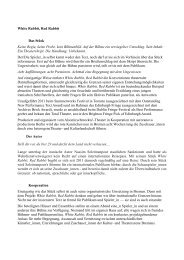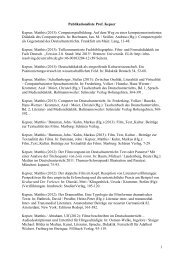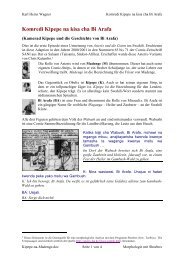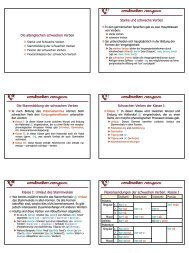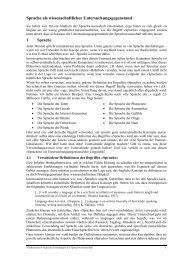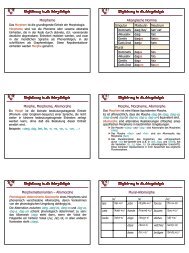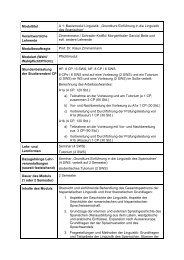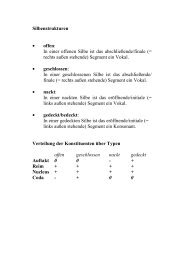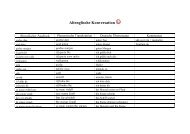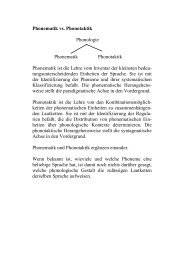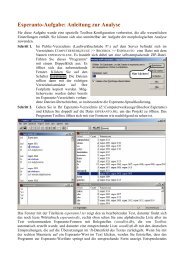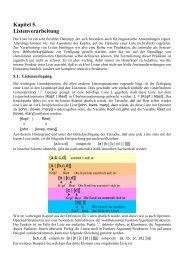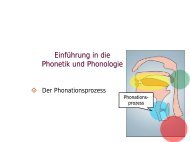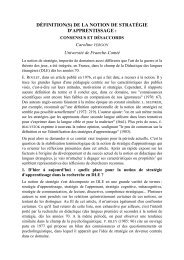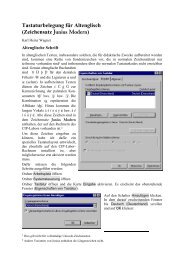Poster zusammengefasst, inkl. Lesezeichen - Fachbereich 10
Poster zusammengefasst, inkl. Lesezeichen - Fachbereich 10
Poster zusammengefasst, inkl. Lesezeichen - Fachbereich 10
You also want an ePaper? Increase the reach of your titles
YUMPU automatically turns print PDFs into web optimized ePapers that Google loves.
Icon<br />
Forms of Differentiation<br />
<strong>Fachbereich</strong> <strong>10</strong>: Fremdsprachendidaktik Englisch<br />
Heterogenität im Englischunterricht: Differenzierung als Notwendigkeit und Chance<br />
Prof. Dr. Sabine Doff<br />
Icon<br />
Internal Differentiation<br />
Internal differentiation aims at the support of each student depending on<br />
their individual way of learning. Its basic idea is to offer a variety of learning<br />
arrangements from which students can choose according to their individual<br />
needs and working techniques. For teachers, this also means to become<br />
providers rather than instructors; their main task is to make internal<br />
differentiation possible while sustaining the social cohesion of the learner<br />
group (Lohmann 2011: 43f.). Current research results, however, state that<br />
internal differentiation methods are not very common at German schools.<br />
As Trautmann and Wischer explain, teachers tend to have a negative<br />
attitude even if they are willing to use these methods in class (2011: 5f.).<br />
They criticise that internal differentiation is difficult to implement since it is<br />
too work-intensive and time-consuming.<br />
Interests<br />
The idea of creating lessons according to pupils‘ interests is based on the<br />
principle of child-centredness, which is one principle of EFL. This principle<br />
includes the idea that the development of children is not unitary, therefore<br />
students‘ interests are distinctive. Thus, teachers have to adjust the content<br />
of the lesson to each group of learners.<br />
Topics of interest are motivating if they evoke emotions, fantasy and<br />
creativity of school children. However, topics have to be authentic,<br />
meaningful and interesting for the pupils. Meaningful topics are subjects<br />
which focus on children‘s areas of interest (Böttger 20<strong>10</strong>).<br />
Sources:<br />
Böttger, Heiner (20<strong>10</strong>), Englisch lernen in der Grundschule. Bad Heilbrunn: Verlag Julius Klinkhardt.<br />
Trautmann, Matthias & Wischer, Beate (2011), Der Vielfalt mit Vielfalt begegnen. Praxis Schule 1, 4-7.<br />
Lohmann, Christa (2011), Differenzierung: Lehrkräfte zwischen Herausforderung und Verunsicherung.<br />
Praxis Englisch 2, 43-45.<br />
Research-oriented Learning (B.A.)



